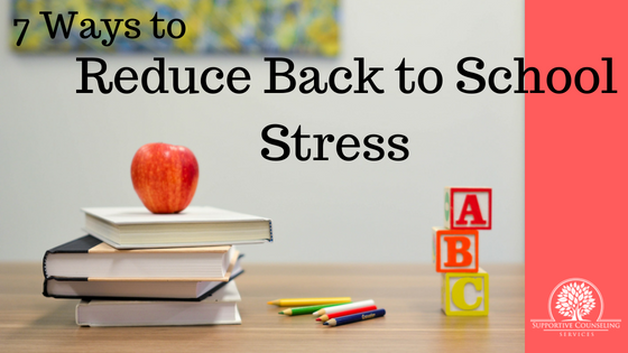|
Heading back to school always brings out a range of emotions but we can all agree stress and anxiety are inevitable. Returning to school can be stressful for many reasons, however keeping a few things in mind will help to reduce the back to school stress we tend to dread every year.
1) Start having conversations about school expectations early. Discussing things like homework and daily behavioral expectations can help prepare your child early. Clear, consistent expectations help ease a child’s anxieties and will make it easier on you as the parent. Being proactive rather than reactive can help decrease arguments and power struggles once school starts. Also, consider how to set those expectations. Setting your child up for success is important. If your child is a struggling learner, expecting them to get straight A’s is unrealistic. Jim Taylor, Ph.D. encourages setting effort expectations. These expectations gives your child control and a sense of achievement even if they struggle academically. 2) Set routines early. Setting bedtime and daily routines is important. But getting your child in those schedules before school starting is equally important. Waiting until the first day of school makes it hard on everyone. Starting two weeks before the start of school can help ease your child back into schedules and good sleep habits. To find out how much sleep your child needs, check out the National Sleep Foundation's recommendations. 3) Visit the school, classroom, and meet the teacher before school begins. Most schools will hold an open house or meet the teacher prior to school starting. Taking advantage of this time will help your student become comfortable in their new surroundings. Especially if your child is new to the school or transitioning to Middle or High School. Allow your child to walk through their new schedules, practice getting in their lockers, and find their classes and the restrooms that are close to their route. 4) Make a play date with an old friend. Reconnecting your child with classmates can help ease social anxieties when returning to school. During these dates, have positive conversations about returning to school and discuss how they can rely on each other if they have problems. This will help your child feel supported while at school even when you are not there. 5) Allow for downtime. Try not to over schedule especially the first few weeks back to school. Providing a little extra downtime can help with stress relief and the inevitable drowsiness your child will likely feel getting back into a routine. 6) Check in daily. Start the new school year with renewed commitment to open communication with your child. Give your child an opportunity to talk about their feelings and feel supported. You can then help them with problem solving skills and encourage positive coping activities to deal with whatever comes their way. 7) Decrease screen time. Summer months can include mind numbing hours in front of the screen. Planning to limit screen time can be difficult, however with enough planning you can slowly wean your child. Encourage movement and thinking activities to prepare your child for starting back to school. Returning to school and returning to a set schedule like any transition can cause varying levels of stress and anxiety. If your child tends to struggle with anxiety it's important to talk to them about their feelings and how to deal with them negative feelings in an appropriate, healthy way. Starting the year off right can set good habits for the rest of the year and decrease overall stress and anxiety for both you and your child.
0 Comments
Your comment will be posted after it is approved.
Leave a Reply. |
AuthorAmanda Be, LMSW, MBA is owner and counselor at Supportive Counseling Services in Grosse Pointe, MI. Amanda has been a practicing clinical social worker since 2005. She is passionate about helping others lead happier, more successful lives through her private practice, advocacy and volunteer work. Amanda’s main objective is to support others during life’s challenges and hopes these blogs will help. She writes and speaks on topics for parents, counselors and educators. Archives
March 2020
Categories
All
|

 RSS Feed
RSS Feed